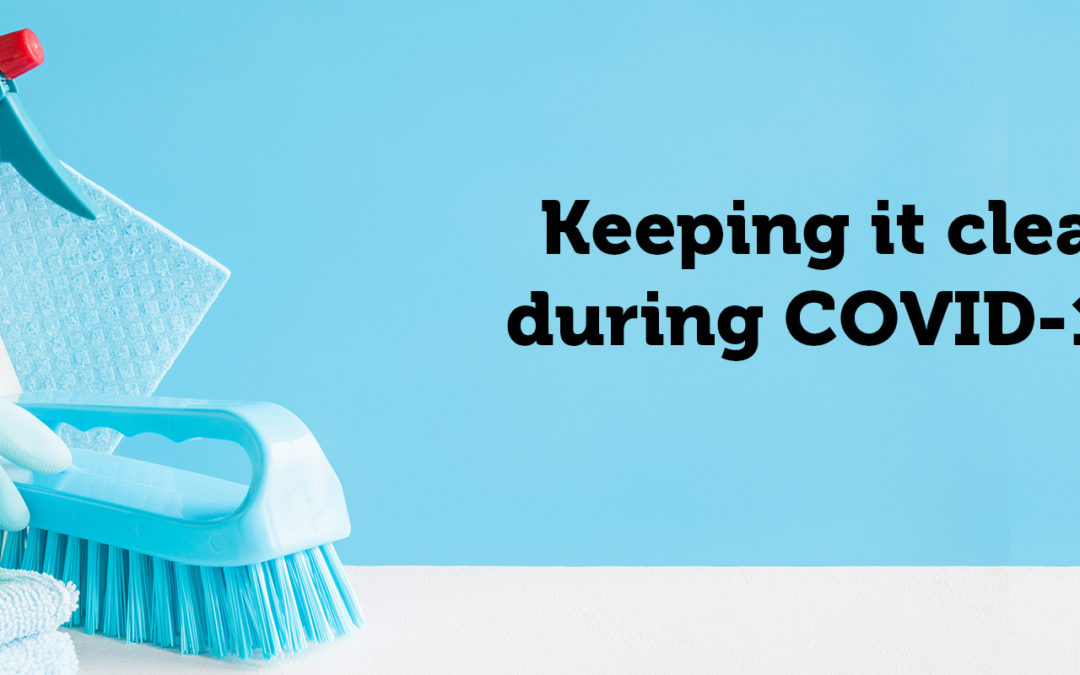Avoid infection with cleaning, disinfection, and hygiene
One of the best ways to avoid infection with COVID-19 is keeping a safe distance – at least six feet – from an infected person. That may be difficult in most correctional or detention facilities.
While the likelihood of contracting COVID-19 from hard surfaces or paper products is lower than airborne, the Centers for Disease Control (CDC) promotes good hand hygiene and cleaning/disinfecting of living, recreation and work areas.
This article highlights the key points related to hygiene, cleaning, and disinfection in the CDC’s Interim Guidance on Management of Coronavirus Disease 2019 (COVID-19) in Correctional and Detention Facilities. Wellpath medical staff follows these CDC guidelines to minimize the chance for infection. Additional details are available in the CDC interim guidance document.
Cleaning and Disinfection
Use household cleaners and EPA-registered disinfectants that are effective against COVID-19 as appropriate for the surface. Clean and disinfect frequently touched surfaces and objects, especially in common areas, such as doorknobs, light switches, sink, countertops, toilets, recreation equipment, kiosks, and telephones.
Before cleaning spaces that have been used by confirmed COVID-19 infected individuals, close-off the area, and open doors and windows for up to 24 hours, or as practical. Then clean and disinfect. The CDC guidance provides areas that require extra attention.
The CDC guidance provides cleaning tips for hard and soft/porous surfaces and electronic equipment.
Individuals providing cleaning and disinfection services should wear protective equipment.
Food Service
Disposable food service items for individuals under medical isolation should be discarded in the trash in their medical isolation room. Non-disposable food service items should be handled with gloves and washed with hot water or in a dishwasher. Individuals handling used food service items should clean their hands after removing gloves.
Laundry
Laundry for infected and non-infected individuals can be washed together. Individuals handling laundry from COVID-19 cases should wear disposable gloves, discard after each use, and clean their hands after.
Avoid shaking dirty laundry to minimize the possibility of dispersing virus through the air. Launder items as appropriate in accordance with the manufacturer’s instructions. If possible, launder items using the warmest appropriate water setting for the items and dry items completely.
Clean and disinfect clothes hampers according to guidance for surfaces. If permissible, use a disposable bag liner or one that can be laundered
Hygiene
Provide incarcerated and detained individuals and staff with no-cost access to hygiene products to reinforce healthy hygiene throughout the facility, including bathrooms, food preparation and dining areas, intake areas, visitor entries and exits, visitation rooms and waiting rooms, common areas, medical, and break rooms.
Encourage cough etiquette and hand hygiene, and discourage touching the face, sharing eat/drinking utensils, and needless physical contact. Provide staff and incarcerated/detained individuals with no-cost access to liquid or non-irritating bar soap, running water, hand-drying machines, paper towels, tissues, and no-touch trash receptacles. If policies allow, provide alcohol-based hand sanitizer with at least 60% alcohol. Consider allowing staff to carry individual-sized bottles to maintain hand hygiene.
Communicate the relationship with COVID-19 and sharing drugs or drug preparation equipment.
Wellpath cares for large numbers of patients in close quarters. We do all we can to keep patients and employees healthy. This includes taking aggressive actions to prevent COVID-19 from entering, reminding facility and clinical staff to sanitize common areas multiple times a day and practicing proper hand hygiene.
The time to start is now. Even if COVID-19 is already inside the facility, reinforcing good hygiene and cleaning/disinfection practices, combined with social distancing strategies, can contribute to reduced transmission of the disease.
